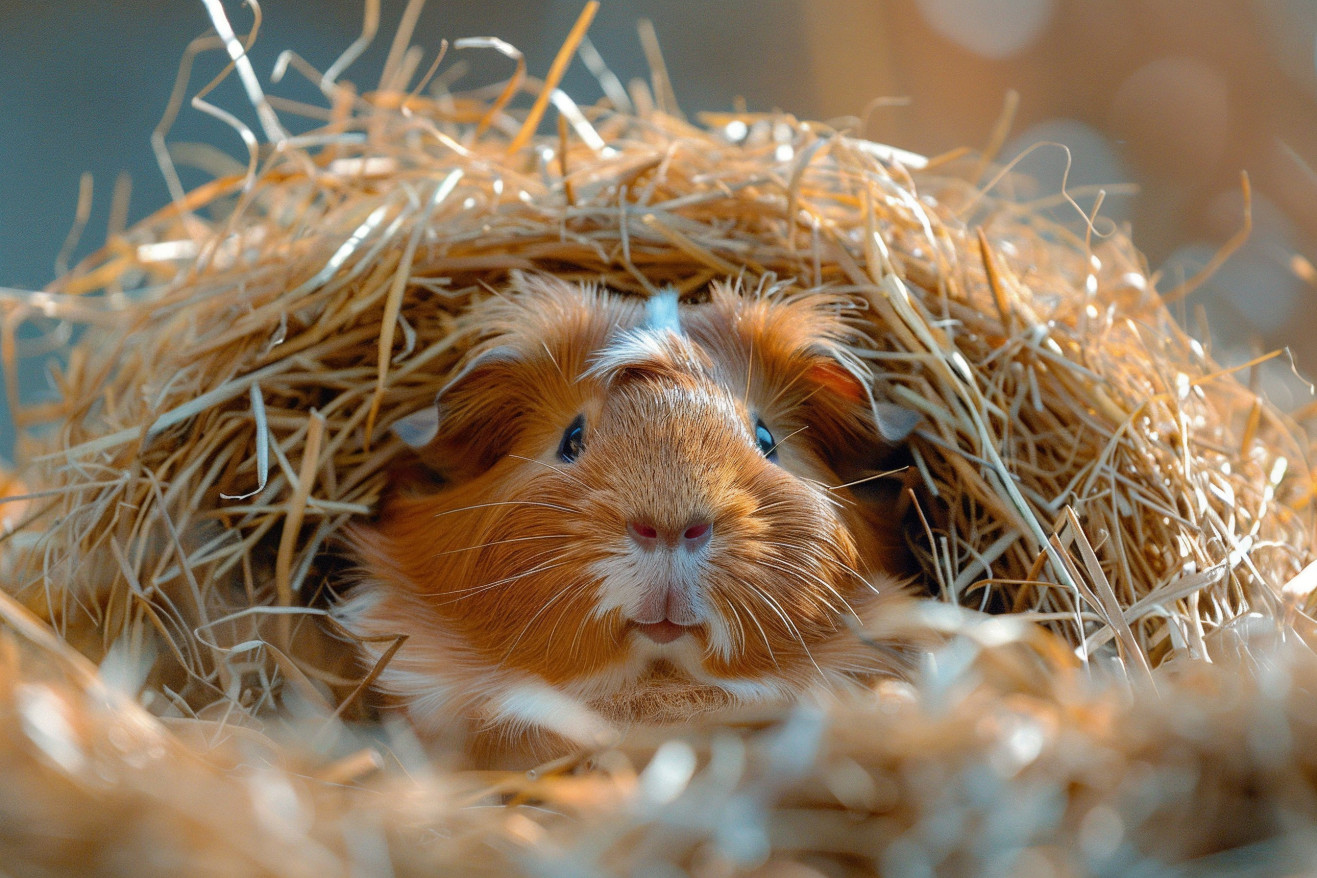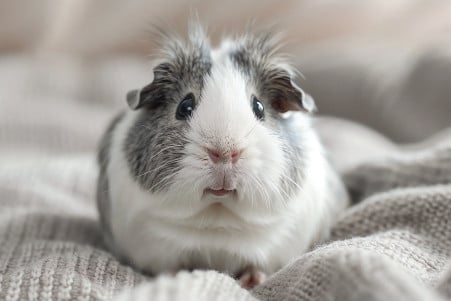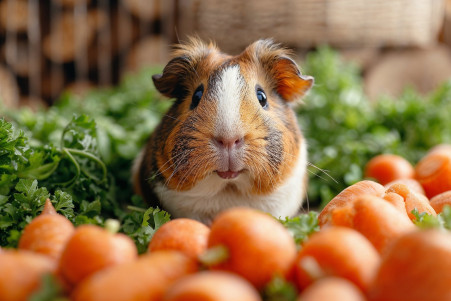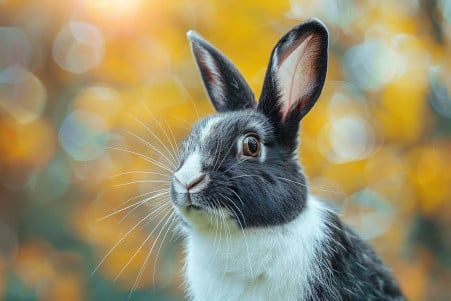Can Guinea Pigs Purr? Exploring Their Vocal Repertoire
19 May 2024 • Updated 18 May 2024

Some guinea pig owners are convinced that they have heard their pets purring, while others are equally convinced that guinea pigs don't make that kind of noise at all. So, can guinea pigs purr? The answer is a little complicated. Guinea pigs don't purr in the way that cats do, because they don't have the physical ability to vibrate their vocal cords like cats do when they purr. That said, guinea pigs do make a range of soft humming, cooing, and wheeking sounds that some people have described as purring when the guinea pig is happy and relaxed.
Although there are no studies that specifically investigate the phenomenon of "guinea pig purring," this article will summarize the findings of animal behaviorists, veterinary scientists, and guinea pig authorities who have studied the sounds that guinea pigs make and what those sounds might mean. By delving into this specialized area of animal research, you'll learn whether or not your guinea pig's happy chirps and hums can be considered a form of purring.
Can guinea pigs purr?
Guinea Pig Vocalizations: What Is Purring?
Guinea pigs make a variety of noises in addition to the well-known wheeking and cooing sounds. One of the most interesting is purring, which is a low, constant humming or vibrating sound that is often associated with happiness and contentment. As GuineaDad points out, purring is often heard during moments of bonding, such as when you're petting or holding your guinea pig and they are completely relaxed and "flat like a pancake."
That said, the meaning of purring can vary depending on the situation. For example, when your guinea pig is eating, purring may be a sign that they are enjoying their favorite treats. On the other hand, The Spruce Pets explains that higher-pitched purring, especially if it gets higher at the end, is more likely to be a sign of irritation. Meanwhile, a very short "durr" purr that's accompanied by the guinea pig freezing in place can be a sign of fear or uncertainty.
In other words, while a deep, relaxed purr is likely to be a sign that your guinea pig is happy and content, it's important to take the situation and the guinea pig's body language into account. For example, if your guinea pig is purring while vibrating, head butting, or hiding, it's likely that the purr is a sign of something other than contentment. By recognizing the nuance in guinea pig vocalizations, you can better understand what your guinea pig is trying to tell you and respond to their needs more effectively.
Other Signs of a Happy and Content Guinea Pig
In addition to purring, guuinea pigs display other signs that they are happy and content. According to Penthouse Piggies, things like 'zoomies' (sudden bursts of energetic running), 'popcorning' (jumping and twisting in the air), and 'wheeking' (enthusiastic squeaking) are all signs of a happy guinea pig. The RSPCA also says that guinea pigs are social animals, and signs of affection like nuzzling, eating from your hand, and seeking interaction are all signs of a happy, healthy guinea pig.
Making sure that your guinea pig has a stimulating environment with toys, hiding spots, and opportunities for social interaction can help ensure that they experience positive emotional states. As GuineaDad says, an active, social, and engaged guinea pig is usually a happy one. Knowing these signs can help you make sure that your guinea pig is purring because they are happy and content, rather than because they are stressed or uncomfortable.
Why Guinea Pigs Get Stressed and Unhappy
Guinea pigs are prey animals, so they are naturally sensitive to changes in their environment, temperature, and routine. According to BeChewy, "Guinea pigs can be stressed by changes in temperature or in habitat, especially if new pigs are introduced to the group." Other common stressors include small enclosures, boredom, perceived threats, excessive handling, and loud noises.
Stress in guinea pigs can manifest in a number of ways, including hiding, aggression, loss of appetite, hair loss, cage chewing, freezing, and vocalizations like whining and hissing. As GuineaDad notes, teeth chattering, hissing, growling, and whining are all vocal signs of an unhappy guinea pig. Home & Roost adds that visual signs of stress can include aggression, irritability, sleeping more, and bald patches.
It's important to address these stressors to ensure a guinea pig's overall health and happiness. If a guinea pig stops purring or starts showing signs of stress, it could be a sign of a larger problem that needs to be addressed with proper care and environmental stimulation.
How to Create a Healthy and Enriching Environment for Your Guinea Pig
In order to create a healthy and enriching environment for your guinea pig, it's important to make sure that they have a safe and stimulating place to live. As reported by WOWT, this means that their habitat should have flat surfaces and an abundance of Timothy hay, not wire-bottomed cages that can hurt their sensitive feet. It also means that they should be fed a diet of guinea pig chow, fresh vegetables, and vitamin C supplements.
In addition to their physical environment, regular handling, time outside of their cage, and the chance to interact with other guinea pigs can help lower stress and increase happiness. As mentioned in the Guinea Pig Cages forum, guinea pigs are social animals and can get lonely without other guinea pigs to keep them company. By making sure that their physical and social needs are met, owners can make sure that their guinea pigs are in the best position to be happy and purring.
In the end, it's important to make sure that their environment is enriching so that they can experience positive emotions and exhibit behaviors like purring that are often associated with contentment. With the right care, your guinea pig can be happy and show that they are a content and satisfied pet.
Conclusion: What Does It Mean When a Guinea Pig Purrs?
While guinea pigs don't purr in the same way as cats, their various vocalizations, including purring-like sounds, can provide insights into their emotional states. According to Vet Help Direct, purring in guinea pigs is typically associated with contentment and happiness, but it can also indicate annoyance, fear, or discomfort depending on the context and accompanying body language.
Guinea pigs can vibrate and purr when they are happy, but this same behavior can also signal anger, feeling threatened, or stress. The South China Morning Post explains that determining the meaning requires understanding the full context and the guinea pig's body language. A tense, hunched posture along with low-pitched purring likely indicates a negative emotional state.
By understanding the range of guinea pig vocalizations, behaviors, and environmental factors, owners can better interpret and respond to their guinea pig's purring sounds. Providing a healthy, enriching environment and meeting a guinea pig's physical and social needs can encourage positive emotional states and promote more frequent purring. Recognizing and addressing signs of stress or discomfort can help ensure a guinea pig's overall well-being and happiness.


